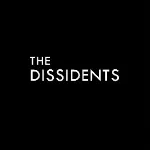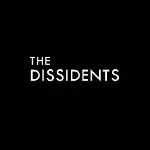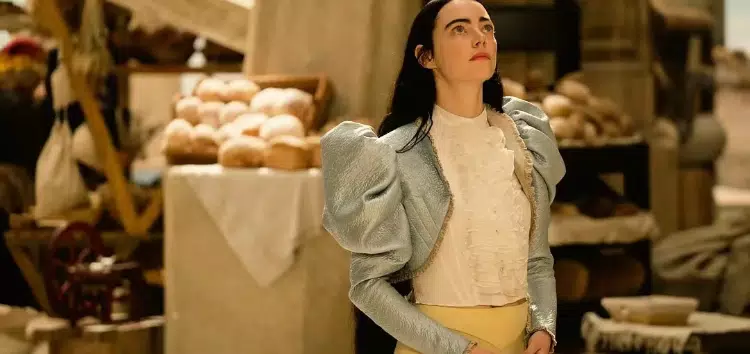
Horror films, as a widely popular movie genre, are becoming both more mainstream and market driven. At the same time, some films are transcending the genre to become auteur cinema, with M. Night Shyamalan's works being a prime example. His latest film, Knock at the Cabin, based on Paul Tremblay’s horror novel The Cabin at the End of the World, is a testament to the best that the horror genre has to offer this year. The plot follows a family who are held hostage by four strangers who claim that they must sacrifice one of their own family members to prevent the end of the world.
Horror films often feature a same clichéd sequence: in Knock at the Cabin, the little girl Wen travels through the forest trying to escape from the cabin; she decides to take a quick peek behind her to check for safety. First, she glances to her left and confirms that it's safe on that side. Then, she turns her head to the right to double-check the right side for safety as well. In an instant, she swivels back to the left to make a run for it. It's at this moment that the bulky fellow Leonard suddenly emerges from the left, delivering a minor jump scare. In the context of classic cinematic storytelling, the character's leftward glance serves to confirm a temporary illusion of safety for the audience, and when the camera returns, it reveals its true nature. This dramatic sequence isn't about the character's actual movements; its primary purpose is to immerse the audience in the film, which represents the fundamental philosophy of the horror genres.

Horror films thrive on specific scenarios. In many horror-oriented works, including several of Shyamalan's earlier productions, the use of unknown elements consistently creates compelling and perilous scenarios. Take The Village, for instance, with its forbidden color and unexplored outer world, or Old, featuring time distortions on a mysterious beach, and The Happening, where unexplained terrifying assaults and mass killings unfold. However, Knock at the Cabin diverges from the typical portrayal of unknown terror. What captivates us is a different form of suspense: the group of people intruding into the tranquil cabin - are they a cult of religious fanatics and terrorists, or could their claims be true, that the world outside the cabin is truly on the brink of apocalypse, and they are the prophesied saviors, the Knights of the Apocalypse, attempting to rescue a collapsing world? This suspense doesn't revolve around some unknown element; it revolves around a potentiality. The audience is faced with a decision regarding the film's suspense - whether to believe in the impending doomsday or anticipate an entirely different outcome.
Similarly, in Nicholas Ray's The Lusty Men, an unstable triangular structure is established: McCloud entices Wes into the world of rodeo, jeopardizing Louise's stable life; the possible romantic connection between McCloud and Louise could leave Wes in isolation; as for Wes and Louise, whose love are already justified by their marriage, McCloud's interference might merely be an illusion. McCloud's motives remain obscure, Wes's abilities remain unknown, and the Louise’s love remain uncertain. Consequently, we can never be sure who will win in the next rodeo. In Knock at the Cabin, the sudden appearance of strangers armed with weapons, the television screen demonstrating images of the disasters, and the warm, cherished memories of the gay couple in the flashbacks - any of these elements could divert the narrative onto an unexpected path at any given moment. Perhaps, this uncertainty is one of the ways genre films rejuvenate themselves. As films progress, they burn away the clichéd foundations of the genre, replacing them with uncharted possibilities. They challenge the audience's ingrained experiences, crafting a magnificent display of fireworks along unforeseen trajectories.

As a result, there are always sacrifices, for the triumph of fire inevitably results in the burning of wood. So, have the sacrificed ones ceased to exist? Have they been forsaken, perhaps? It's essential to recognize that a film doesn’t merely go after a chain of victories; it also encompasses covert combatants and silent battlefields. David Lynch's The Straight Story defies everyone's expectations: the world of Straight appears to be an ideal realm where love abounds and where those enigmatic and gloomy Lynchian elements seem to have vanished. However, on the fringes of the film, dark and ashen remnants of hidden terror quietly fester. No actual events transpire; it's as if everything is just a misunderstanding that has been resolved. Nevertheless, a glimpse of a campfire in the midst of the darkness doesn't signify the vanquishing of the darkness itself. Instead, the darkness reenters the film in a different capacity, and we must find its adversary.

Let’s return to the horror genre: their rules are not specially designed but are chosen based on market demand. Horror films, by their nature, involve terrifying situations that engage the audience. The necessity of these situations often overshadows the need for logic, leading to certain inconsistencies in its plot. Simultaneously, horror films explore a fundamental conflict: the battle between humanity and enigmatic, lethal entities. To establish audience empathy, a vulnerable defender and an insurmountable invader are essential. The struggle in horror films unfolds between these two forces: the horrible invader often appears overwhelmingly dominant, leaving the defenders defenseless (from this aspect, the true invader in Knock at the Cabin is the impending apocalypse). To resist the horror’s overwhelming dominance, the emergence of love, representing a seemingly limitless energy, seems imperative, and it becomes a vital theme in Shyamalan's works. However, in his works, and in many outstanding films, love doesn't act as the savior of the story, nor is it the weapon to vanquish adversaries, or the magical solution to alter the course of events. Love, in its true essence, remains nothing but a mystery of life and a truth waiting to be unveiled. In Knock at the Cabin, love doesn't rescue the family from the apocalypse; instead, it helps them to achieve an alternative victory through sacrifice. In The Happening, it isn't love that conquers the unknown virus, but the rules behind those sequential movements. In The Straight Story, friendship is not only a means to resolve past traumas and melancholy, but also a relationship of love which manifests in the present moment and extends into the future. On the contrary, what makes love meet its demise in a film also bring the film itself to its own death. In those mediocre works, love is often seen as a dialectical weapon, a substitute for structural and script necessities, an accessory caught between power and adventure. In such transactions, love is confined to finite value.



The Village uncovers the truth of a man-made utopia isolated from modern society, while Old exposes the dark reality of an evil scientific experiment. In Shyamalan's horror films, mystery always find their resolution; it's his artistic choice. While Knock at the Cabin doesn’t give an answer to the unknown, it still arrives at a point where the characters must choose what they believe. Contrast to the realistic truths of the previous works, Knock at the Cabin embraces an apocalyptic truth that aligns with the essence of cinema. However, as the four visitors’ role are akin to the rocky shores in Old and the taboos in The Village, sacrifices are inevitable to leave the room. Shyamalan's films often have foundations that appear abrupt and hastily considered, and his sudden twists of the story feel like idiosyncratic music trying to lead the audience out of immersion. In his films, we can easily scrutinize the worlds depicted, granting us the authority to believe in the director and his films. It's only by actively choosing to believe in his films that we can secure our ticket to enter the cinematic experience.

written by Orange
THE DISSIDENTS are a collective of cinephiles dedicated to articulate our perspectives on cinema through writing and other means. We believe that the assessments of films should be determined by individuals instead of academic institutions. We prioritize powerful statements over impartial viewpoints, and the responsibility to criticize over the right to praise. We do not acknowledge the hierarchy between appreciators and creators or between enthusiasts and insiders. We must define and defend our own cinema. |

















 Join the conversation and share your thoughts!
Join the conversation and share your thoughts!






































